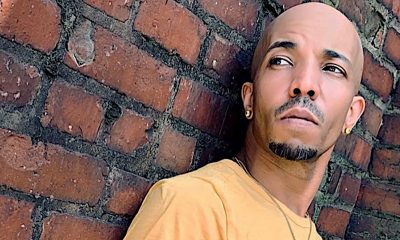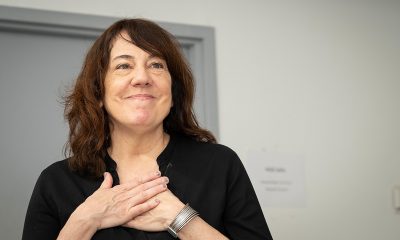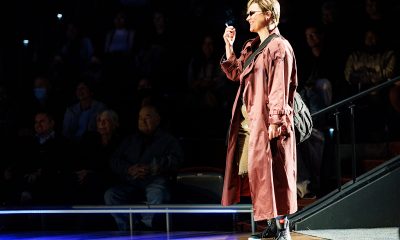Arts & Entertainment
Maintaining mystery
Out actor Spinella says ‘Velocity’ better experienced blind
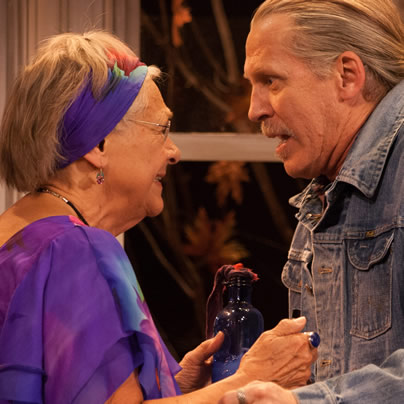
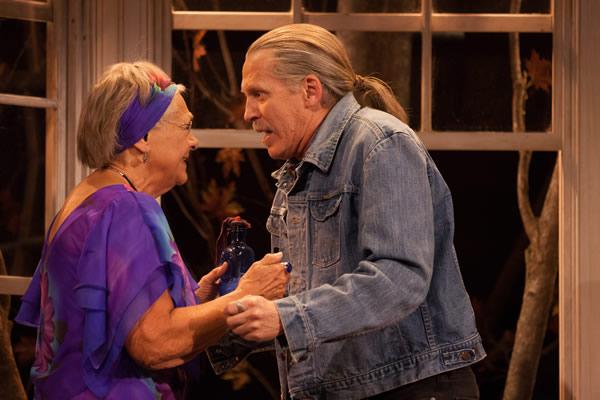
Estelle Parsons as Alexandra and Stephen Spinella as Chris in “The Velocity of Autumn’ at Arena Stage at the Mead Center for American Theater. It runs through Oct. 20. (Photo by Teresa Wood; courtesy Arena)
‘The Velocity of Autumn’
Through Oct. 20
Arena Stage
1101 Sixth Street, SW
$40-90
Arenastage.org
Broadway star Stephen Spinella almost never leaves New York City to work.
“I’ll only go for incredibly special situations,” he says. “I love my apartment. I have a great support system of friends. I’m just not a happy camper outside of New York. It’s got to be something really great to tempt me.”
Playing opposite Academy Award-winning actress Estelle Parsons in Arena Stage’s “The Velocity of Autumn” is one of those impossible-to-refuse situations.
“Last winter I got a call from Molly Smith [Arena’s artistic director and ‘Velocity’s’ director] offering me the job,” says Spinella, who is gay. “I asked why they’d reached out to me. Molly said I was Parsons’ first choice to play her son. You don’t say no to that.”
Penned by Cleveland-based playwright Eric Coble, the two-character play focuses on 79-year-old Alexandra, who is experiencing the early signs of dementia. Holed up in her Brooklyn brownstone with a cache of homemade explosives, she threatens to blow up the house and herself rather than rethink a less independent living arrangement. It’s then that her estranged gay son Chris is brought in to mediate.
Spinella, widely known for his brilliant Tony Award-winning performances as Prior Walter (a gay man with AIDS) in “Angels in America: Millennium Approaches” and “Angels in America: Perestroika,” won’t reveal much — he believes an audience should experience a play blind. But he will say that in 90 uninterrupted minutes, Chris and Alexandra must find out where they’ve been, where they are now and how they’re going to resolve her issues. It’s a lot to cover.
In real life, Spinella’s 90-year-old mother suffers from dementia. She lives in a care facility in Arizona. But unlike his mother, says Spinella, “Alexandra is still very alert and aware. She’s an artist and very self-reliant. Her character is processing what is happening to her and what she wants to do. That’s a big part of what the play is about.”
And while we’re told Spinella’s character is gay, it’s mentioned rather offhandedly. The straight playwright Coble, says he was intrigued with the idea of Chris’ sexuality not being the focal point.
“So often when being gay is used as a dramatic device it’s the entire focus of the character,” Coble says. “I wanted to write a character who’s not struggling with his sexuality. There are other reasons why he needed to get out of New York City and live far from his mother and more conventionally successful siblings.”
Spinella concurs: “The fact that he’s gay is almost completely unimportant to the play. It’s a minor revelation. When he left home, it was probably more important but it’s essentially dissolved in the way that it has for so many of us in this country.”
For Coble, having Parsons (who won her Oscar for “Bonnie and Clyde” and hilariously played Bev on “Roseanne” for a decade) and Spinella bring his characters to life has been a joy and slightly unnerving. “They’re so good and so smart,” he says. “Their ‘truthometers’ are very high — they have a way at getting at the kernel of truth in every moment. It’s an incredible thing to see and experience.”
And Spinella is rhapsodic about 85-year-old Parsons: “She has that frank New England aspect. It’s great for the character. She’s always surprising — incredibly smart and sensitive with a steel trap mind. She and her husband Peter are both like jocks. They cycle, walk, swim and hike. They’re also fun — really wonderful people.”
Next year, Spinella can be seen HBO’s movie version of Larry Kramer’s seminal AIDS play “The Normal Heart.” He describes the experience as fantastic and intense. His part (Sanford) is small but important. “Early in the play his KS lesions are revealed in the doctor’s office,” says Spinella. “And later, in a newly added scene set in a hospital, he is wild with dementia, calling for his dog. He totally loses it and falls apart.”
But for today, Spinella is happily immersed in “Velocity.” When the show closes next month, he returns to New York City, that place he hates to leave.

Team DC, the umbrella organization for LGBTQ-friendly sports teams and leagues in the D.C. area, held its annual Night of Champions Awards Gala on Saturday, April 20 at the Hilton National Mall. The organization gave out scholarships to area LGBTQ student athletes as well as awards to the Different Drummers, Kelly Laczko of Duplex Diner, Stacy Smith of the Edmund Burke School, Bryan Frank of Triout, JC Adams of DCG Basketball and the DC Gay Flag Football League.
(Washington Blade photos by Michael Key)




















The 2024 National Cannabis Festival was held at the Fields at RFK Stadium on April 19-20.
(Washington Blade photos by Michael Key)
















Covering the @NatlCannaFest at RFK Stadium for @WashBlade . Stop by the LGBTQ+ booth and pick up a paper if you are here. pic.twitter.com/is7hnsaPns
— Michael Patrick Key (@MichaelKeyWB) April 20, 2024
Theater
‘Amm(i)gone’ explores family, queerness, and faith
A ‘fully autobiographical’ work from out artist Adil Mansoor

‘Amm(i)gone’
Thorough May 12
Woolly Mammoth Theatre
641 D St., N.W.
$60-$70
Woollymammoth.net
“Fully and utterly autobiographical.” That’s how Adil Mansoor describes “Amm(i)gone,” his one-man work currently playing at Woolly Mammoth Theatre.
Both created and performed by out artist Mansoor, it’s his story about inviting his Pakistani mother to translate Sophocles’s Greek tragedy “Antigone” into Urdu. Throughout the journey, there’s an exploration of family, queerness, and faith,as well as references to teachings from the Quran, and audio conversations with his Muslim mother.
Mansoor, 38, grew up in the suburbs of Chicago and is now based in Pittsburgh where he’s a busy theater maker. He’s also the founding member of Pittsburgh’s Hatch Arts Collective and the former artistic director of Dreams of Hope, an LGBTQ youth arts organization.
WASHINGTON BLADE: What spurred you to create “Amm(i)gone”?
ADIL MANSOOR: I was reading a translation of “Antigone” a few years back and found myself emotionally overwhelmed. A Theban princess buries her brother knowing it will cost her, her own life. It’s about a person for whom all aspirations are in the afterlife. And what does that do to the living when all of your hopes and dreams have to be reserved for the afterlife?
I found grant funding to pay my mom to do the translation. I wanted to engage in learning. I wanted to share theater but especially this ancient tragedy. My mother appreciated the characters were struggling between loving one another and their beliefs.
BLADE: Are you more director than actor?
MANSOOR: I’m primarily a director with an MFA in directing from Carnegie Mellon. I wrote, directed, and performed in this show, and had been working on it for four years. I’ve done different versions including Zoom. Woolly’s is a new production with the same team who’ve been involved since the beginning.
I love solo performance. I’ve produced and now teach solo performance and believe in its power. And I definitely lean toward “performance” and I haven’t “acted” since I was in college. I feel good on stage. I was a tour guide and do a lot of public speaking. I enjoy the attention.
BLADE: Describe your mom.
MANSOOR: My mom is a wonderfully devout Muslim, single mother, social worker who discovered my queerness on Google. And she prays for me.
She and I are similar, the way we look at things, the way we laugh. But different too. And those are among the questions I ask in this show. Our relationship is both beautiful and complicated.
BLADE: So, you weren’t exactly hiding your sexuality?
MANSOOR: In my mid-20s, I took time to talk with friends about our being queer with relation to our careers. My sexuality is essential to the work. As the artistic director at Dreams of Hope, part of the work was to model what it means to be public. If I’m in a room with queer and trans teenagers, part of what I’m doing is modeling queer adulthood. The way they see me in the world is part of what I’m putting out there. And I want that to be expansive and full.
So much of my work involves fundraising and being a face in schools. Being out is about making safe space for queer young folks.
BLADE: Have you encountered much Islamophobia?
MANSOOR: When 9/11 happened, I was a sophomore in high school, so yes. I faced a lot then and now. I’ve been egged on the street in the last four months. I see it in the classroom. It shows up in all sorts of ways.
BLADE: What prompted you to lead your creative life in Pittsburgh?
MANSOOR: I’ve been here for 14 years. I breathe with ease in Pittsburgh. The hills and the valleys and the rust of the city do something to me. It’s beautiful, it’ affordable, and there is support for local artists. There’s a lot of opportunity.
Still, the plan was to move to New York in September of 2020 but that was cancelled. Then the pandemic showed me that I could live in Pittsburgh and still have a nationally viable career.
BLADE: What are you trying to achieve with “Amm(i)gone”?
MANSOOR: What I’m sharing in the show is so very specific but I hear people from other backgrounds say I totally see my mom in that. My partner is Catholic and we share so much in relation to this.
I hope the work is embracing the fullness of queerness and how means so many things. And I hope the show makes audiences want to call their parents or squeeze their partners.
-

 District of Columbia5 days ago
District of Columbia5 days agoNew D.C. LGBTQ+ bar Crush set to open April 19
-

 South America3 days ago
South America3 days agoDaniel Zamudio murderer’s parole request denied
-

 Maryland4 days ago
Maryland4 days agoMontgomery County police chief discusses arrest of trans student charged with planned school shooting
-

 Politics5 days ago
Politics5 days agoCourt records raise concerns about right-wing TikTok investor’s influence

